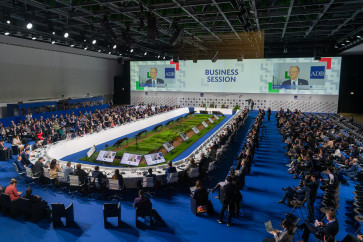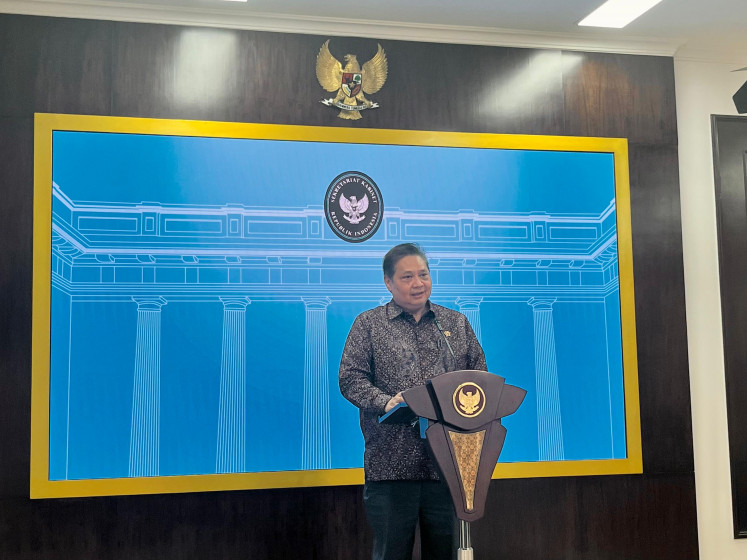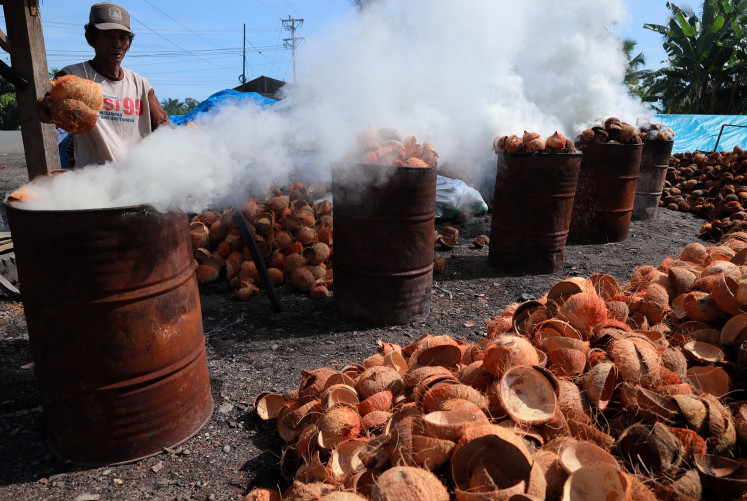Political parties slow down country's graft fight
Politicians and party members are involved in corruption cases more often than people from other professions.
Change text size
Gift Premium Articles
to Anyone
 Who you gonna call? Graftbusters!: President Joko “Jokowi” Widodo (right) greets Coordinating Political, Legal and Security Minister Wiranto (third from right) during an International Anticorruption Day commemoration in South Jakarta on Monday. Corruption Eradication Commission (KPK) chairman Agus Rahardjo (second from right) and commissioners Saut Situmorang (left), Alexander Marwata (second from left), Basaria Panjaitan (third from left) and Laode M. Syarif were also in attendance. (The Jakarta Post/Seto Wardhana)
Who you gonna call? Graftbusters!: President Joko “Jokowi” Widodo (right) greets Coordinating Political, Legal and Security Minister Wiranto (third from right) during an International Anticorruption Day commemoration in South Jakarta on Monday. Corruption Eradication Commission (KPK) chairman Agus Rahardjo (second from right) and commissioners Saut Situmorang (left), Alexander Marwata (second from left), Basaria Panjaitan (third from left) and Laode M. Syarif were also in attendance. (The Jakarta Post/Seto Wardhana)
A
s part of the commemoration of International Anticorruption Day, the Corruption Eradication Commission (KPK) is building on its momentum to urge for internal reform within political parties, which are considered the Achilles’ heel of the country’s fight against graft.
Politicians and party members are involved in corruption cases more often than people from other professions. According to data from the KPK’s Anticorruption Clearing House, there were at least 229 politicians in legislative institutions prosecuted by graft busters from 2007 to September this year.
While the idea of party reform had been around since Antasari Azhar was KPK chairman between 2007 and 2009, the KPK’s current chairman Agus Rahardjo said it became important once again because of Indonesia’s latest Corruption Perception Index (CPI) score.
During the opening of Tuesday’s commemoration of International Anticorruption Day, which falls every Dec. 9, he highlighted Indonesia’s CPI score, which has remained stagnant at 37 out of 100 for the second year in a row.
“We obtained a low score in political and democratic aspects — political parties play roles in both. Therefore, we will ask for commitments from these parties to enforce the political integrity of their respective institutions,” Agus said.
It was not the first time political parties have been considered the weak links in the country’s graft fight. Another survey conducted by Transparency International Indonesia (TII) in 2017 had listed the House of Representatives as the institution judged by Indonesians to be the most corrupt, followed by government officials and regional councils.
In accordance with the findings, the TII called on political parties to conduct reform and improve their performances at the House and in regional councils.
“The successful of the antigraft movement is not measured by the number of people prosecuted for alleged corruption, but the low number of people committing the crime,” President Joko “Jokowi” Widodo said during in his opening speech.
The antigraft body said the reform package, which is called the Political Party Integrity System, would focus on a number of components of political parties: codes of ethics, internal democratic processes within parties, member recruitment and party funding.
The KPK has revealed a number of instances when party officials asked businesspeople to illegally fund their party’s activities, with the latest being a case of alleged bribery related to the construction of a coal-powered power plant in Riau implicating two Golkar Party politicians: Eni Saragih and Idrus Marham.
In a KPK indictment against Eni dated Nov. 29, prosecutors said they suspect Idrus of telling his fellow Golkar politician to ask for US$2.5 million from businessman Johannes Budisutrisno Kotjo to fund the party’s extraordinary congress in December 2017.
The KPK has been working on the system since last year, when the antigraft body visited various political parties to campaign for better party accountability by improving their integrity and financial transparency.
While the 2011 law on political parties requires all to make their financial reports available to the public, a survey by Indonesia Corruption Watch in 2015 showed only three parties had done so, namely the Prosperous Justice Party, the Hanura Party and the Gerindra Party. All high-ranking officials of parties participating in the 2019 election stated their agreement for reform and said each had or would adopt the integrity system soon.
Indonesian Institute of Sciences political analyst Syamsuddin Haris said verbal commitments from parties on the integrity system would not be enough. “High commitment to the system could be shown when parties submit it for the revision of the Political Party Law. This should be the public and civil society organization’s focus from now on.”
This article was originally published in The Jakarta Post's print edition on Dec. 5, 2018, with the title "Political parties slow down country’s graft fight".










